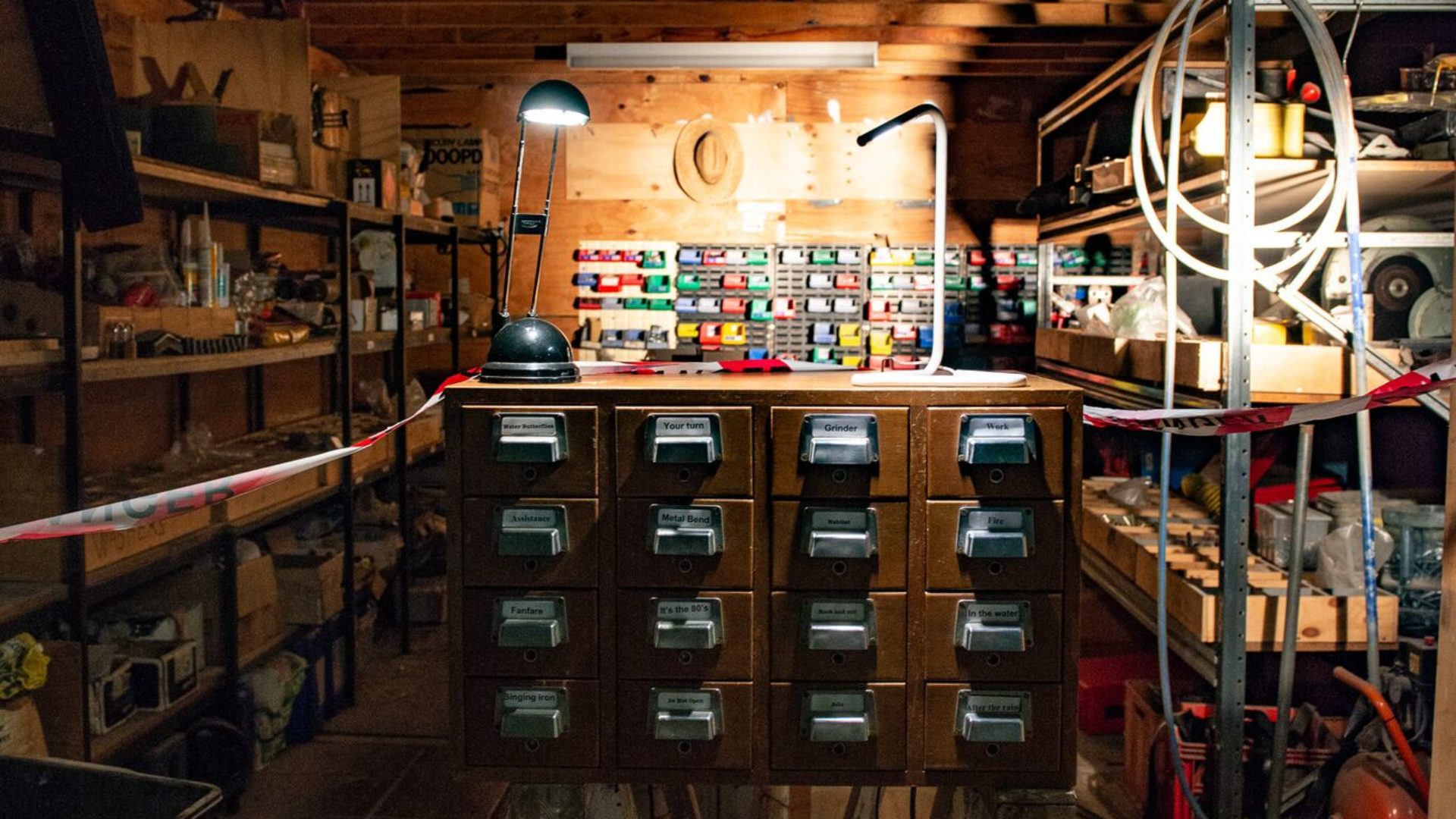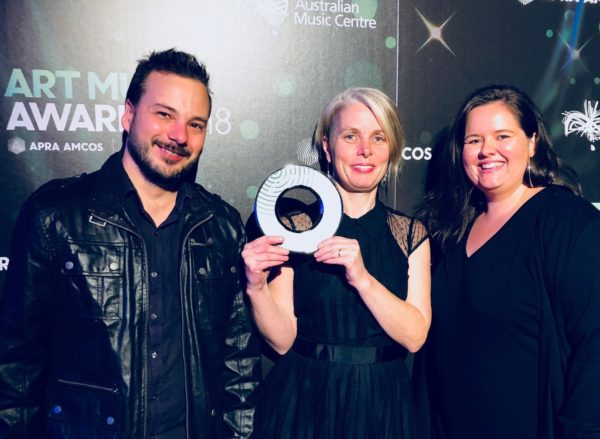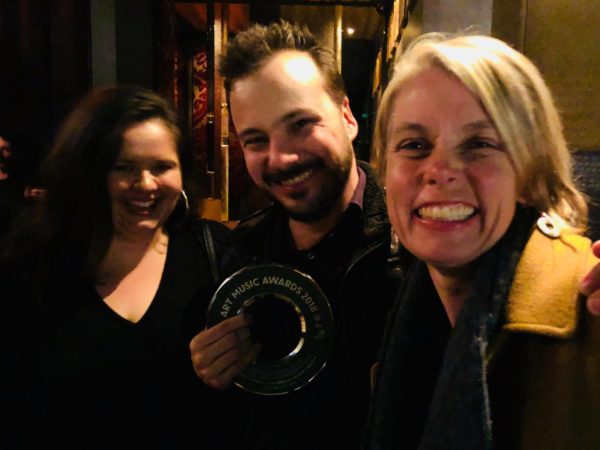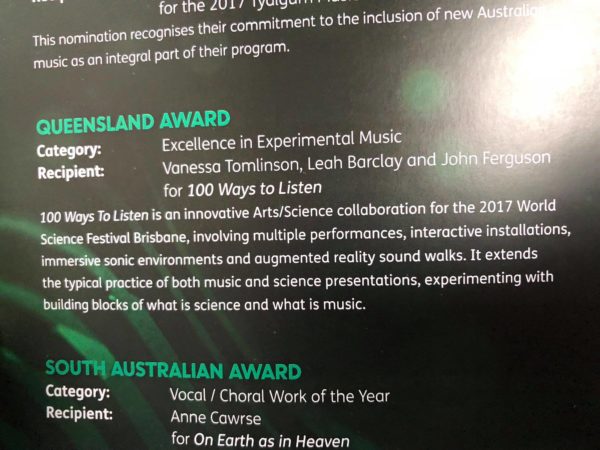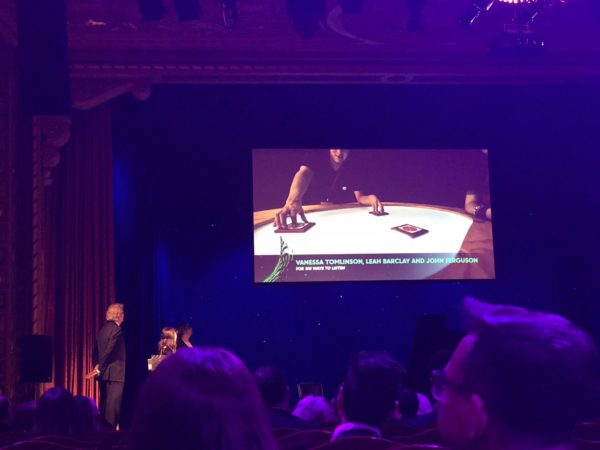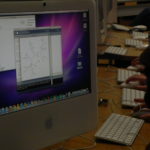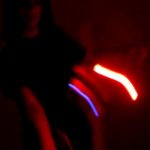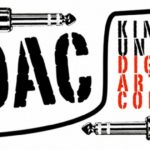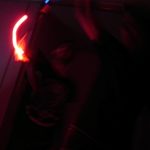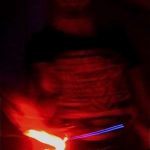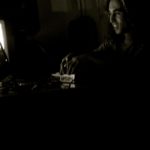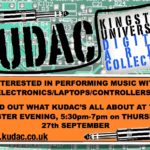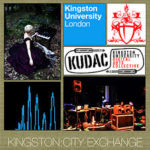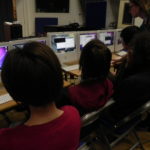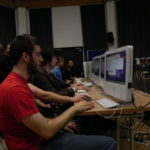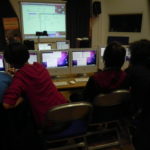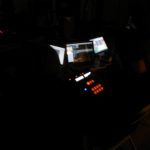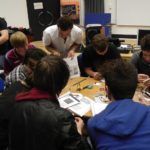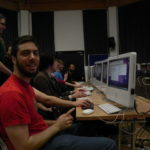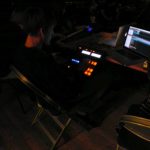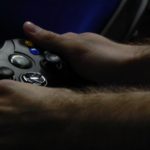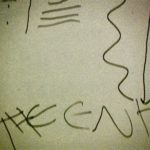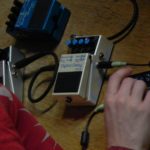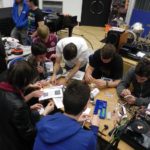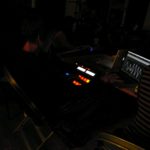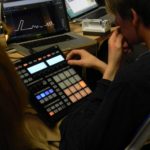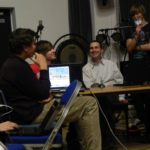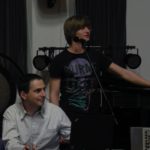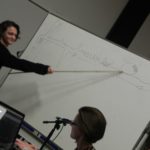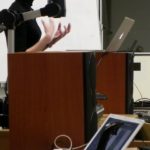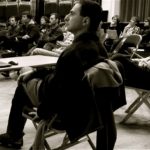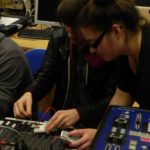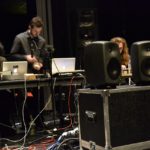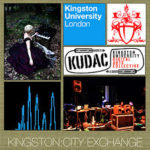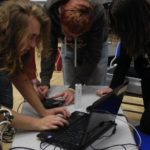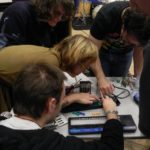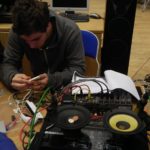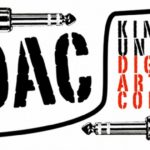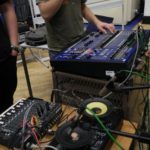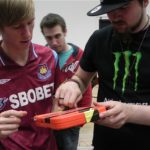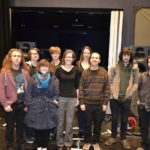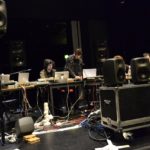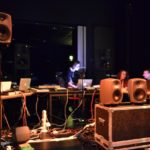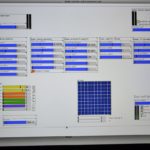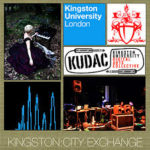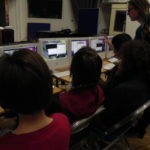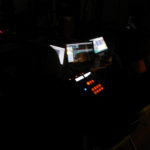Queensland Conservatorium Griffith University (QCGU) 2015-present
Multimedia Project is a second-year course that focuses on broad aesthetic horizons and the refinement and interpretation of skills and techniques introduced in previous trimesters (creative Pure data programming, advanced use of Ableton Live, VCV Rack, etc). Multimedia contexts are explored and new techniques are introduced, but the overall goal is a heightened level of technical finesse and musical creativity. Drawing from both experimental and vernacular backgrounds, this course negotiates technical and aesthetic considerations from practical and theoretical perspectives. Overall, the creation of audiovisual work is at the foreground and the course revolves around an introduction to multimedia programming using Touch Designer (
Live Capstone is a third-year course that explores the theory and practice of sonic and audiovisual art and its presentation in live contexts including performance, installation, and interactive media. The course investigates issues related to experimental music with electronic and digital technologies in particular. Students investigate these ideas in the context of their own creative practice and through the development of new artworks for public presentation. In 2021 there were some advanced Touch Designer networks on display!
Beat Machine is the collaborative project of John Ferguson and Andrew Brown. Beat Machine is a 16 step sequencer and 3 voice synthesizer controlled by 10 potentiometers, 19 buttons, and an accelerometer. Beat Machine was deployed in 2019 and 2021 to teach a course in electronic instruments at Queensland Conservatorium Griffith University, the video below is student work from the class of 2021. For more information see: http://www.johnrobertferguson.com/beat-machine/
Due to COVID-19 I taught online throughout 2020, I also switched my Electronic Instruments class to VCV Rack and there are some student demos below. There’s a nice “day in the life of a CMT student” article written by Tess King here: https://news.griffith.edu.au/2020/08/07/studying-creative-music-technology-at-the-con/
Taught creation and performance with Ableton Live via 1710QCM Interactive Music to first year students while second year course 2710QCM Electronic Instruments focussed on hardware/Pure data. Tom Green did a great job (again) with 3713QCM Liveness in a Virtual World, a concept-driven course that I wrote and delivered for the first time in 2017, nice to see some Touch Designer being used in Liveness too….
JULY-NOVEMBER 2018
In the second half of 2018 I introduced Touch Designer (TD) to final-year music technology students through Music Technology Live Capstone (3720QCM) and to second year students via Multimedia Project (2723QCM). Both courses have an emphasis on the creation of original material and both result in live concerts that are performed in surround sound. TD is a deep and complex program that I’m only just beginning to get grips with, but teaching is a good way to learn! Highlights of student work below and my ‘Introduction to TD’ Prezi too.
In the first half of 2018 I taught creation and performance with Ableton Live via 1710QCM Interactive Music to first year students while second year course 2710QCM Electronic Instruments focussed on hardware/Pure data (see HST1D). I also handed over 3713QCM Liveness in a Virtual World to Tom Green, this is a concept-driven course that I wrote and delivered for the first time in 2017, Tom did an awesome job.
ONE-MINUTE HIGHLIGHTS OF 2017
JULY-NOVEMBER 2017
Music Technology Live Capstone (3720QCM) is a final-year course that involves writing and performing original works with substantial use of technology. In 2017 Multimedia Project (2723QCM) revolved around the creation of original compositions for multichannel sound diffusion (which also means the performances are less visually stimulating than many of the others!)
SONIC PLAYGROUND @ WORLD SCIENCE FESTIVAL BRISBANE 2017
On Saturday 25th March 2017 Music Technology filled Queensland Conservatorium Griffith University with interactive sound installations and hands-on sonic experiments as part of World Science Festival Brisbane. Sonic Playground was supported by Professor Martin Betts (Griffith Engagement) and presented in collaboration with Vanessa Tomlinson and Leah Barclay as part of 100waystolisten.com, a curatorial project at the Queensland Conservatorium Research Centre supported by Griffith University. 60 Students from 1710QCM Interactive Music and 2710QCM Electronic Instruments were at the foreground.
[alpine-phototile-for-flickr src=”set” uid=”78411210@N06″ sid=”72157662814442178″ imgl=”flickr” style=”bookshelf” row=”10″ size=”75″ num=”30″ align=”center” max=”100″]
In 2018 100 Ways to Listen won the Queensland State award for Excellence in Experimental Music and was a finalist in the APRA AMCOS national awards 🙂
JULY 2016 — MAY 2017
In my second year at QCGU I taught a similar range of undergraduate courses to the year previous. New for 2017 was 3713QCM Liveness in a Virtual World, a concept-driven course that introduced creative approaches to digital movie software. New for 2016 was the Feral Pop Ensemble, inspired by Eddie Prévost’s infamous improvisation workshop in London and also John Zorn’s Cobra, this involved large-scale collaboration with students across QCGU, and included a performance at the closing event of the QCGU gala. Dr Tom Green and I redeveloped final-year literature course 3712QCM Digital Music and Culture. Most of the Pure data content that I previously developed for 2710QCM Electronic Instruments was taught by Prof. Andrew Brown as 1723QCM Real-Time Systems, which means that 2710QCM Electronic Instruments features new and fresh content from 2018. Highlights of student work below
JULY 2015-MAY 2016
In my first year at QCGU I taught a range of undergraduate courses: 1710QCM Interactive Music taught first year students to compose and perform with Ableton Live software and various commercial controllers; 2710QCM Electronic Instruments introduced second year students to Pure data/Arduino and the joys of drilling holes in boxes; 2720QCM Web Audio ranged from Gibber, to Ohm Studio, to networked performance; 3720QCM Sonic Art was a final-year multifarious/capstone course, 329QCM Introduction to Music Research focussed on ideas, words, and APA6th. I ran a Handmade Electronic Music Ensemble, which negotiated CMOS chips and breadboards, and taught substantial elements of both 1725QCM Sound Musicianship 1, and 2607QCA the Art of Sound, the later was delivered at Queensland College of Art. Highlights of student work below.
Multimedia and Electronic Music Experiments (MEME) @ Brown University (USA) 2013 — 2015
JANUARY-JUNE 2015
MUSC 1240G: Post-vernacular Composition/‘Pop Music’ gone Feral
This seminar explores the fertile creative territory found around the more adventurous edges of ‘popular’ musics. Drawing from both experimental and popular backgrounds, the focus is on non-notated contemporary composition, but participants are not restricted to traditional conceptualizations of the recording studio or the production of ‘fixed’ works. The idea of post-vernacular is utilized to challenge the view that vernacular or ‘popular’ musics are only oriented towards commercialism and mass popularity i.e. this seminar seeks to extend and build-upon the inherently experimental dimensions of much vernacular musical practice. Developing a comprehensive theoretical and practical knowledge of studio craft, specifically targeted towards creative recording and production techniques, is one objective. However, the main goal is to arrive at an idiosyncratic definition of post-vernacular composition, through practical exploration. Participants will respond to a number of increasingly open-ended assignments, and will complete a final portfolio. [Download syllabus as .pdf]
Exploring Technologically Mediated Performance Practice through the Lens of Jacques Attali’s 1977 Text ‘Noise: The Political Economy of Music’
This course configures Attali’s notions of representing, repeating, and composing as theoretical catalysts for the development of contemporary creative practice. The course is structured around seminars, collaborative ensemble work, and individual projects. We negotiate Attali’s text in its entirety and realize appropriate responses in a variety of formats, including: performance, installation/intervention, audio/video documentation. Additional short readings and presentations enrich critical discussion and practical activity. [Download syllabus as .pdf].
SEPTEMBER-DECEMBER 2014
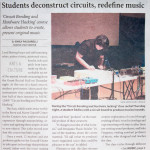 MUSC 1240F: Circuit Bending and Hardware Hacking as Musical and Artistic Expression
MUSC 1240F: Circuit Bending and Hardware Hacking as Musical and Artistic Expression
Creative experimentation with hardware electronics and re-appropriated technologies is the main focus of this course. No prior experience of electronics is required. Initially, we will build a range of simple electronic circuits and explore a variety of strategies to animate and interpret pre-existing electronic devices. Students will then develop individual instruments and/or performance environments and engage in a number of solo and collaborative projects. The aesthetics of handmade electronic music and post-digital performance practice will be foregrounded throughout.
There’s a nice review of the 1240F mid-term concert in the Brown Daily Herald, read it here and see new 1240f and 2230 photos here and here.
[alpine-phototile-for-flickr src=”set” uid=”78411210@N06″ sid=”72157648381588834″ imgl=”flickr” style=”bookshelf” row=”10″ size=”75″ num=”30″ align=”center” max=”100″]
MUSC 2230 Composing and Improvising with Real-Time Systems
In probing the relationship between humans, interfaces, and sonic materials, this seminar will consider: how useful are established notions of composition and improvisation in a contemporary ‘real-time’ age? The overall aim is to develop conceptual discussion and practical experimentation, which will culminate in (at least) two concerts and a variety of web-based outputs, as well as a short piece of reflective writing. It is possible to navigate this course using a variety of software/hardware systems (Ableton Live, Max, PD, turntables, home-brew electronics, etc); a diverse approach to a variety of technologies is highly encouraged.
Also ran the Electroacoustic Improv Ensemble (AKA MEME ENSEMBLE)
JANUARY-JUNE 2014
MUSC 1240G: Post-vernacular Composition/‘Pop Music’ gone Feral
This seminar explores the fertile creative territory found around the more adventurous edges of ‘popular’ musics. Drawing from both experimental and popular backgrounds, the focus is on non-notated contemporary composition, but participants are not restricted to traditional conceptualizations of the recording studio or the production of ‘fixed’ works. The idea of post-vernacular is utilized to challenge the view that vernacular or ‘popular’ musics are only oriented towards commercialism and mass popularity i.e. this seminar seeks to extend and build-upon the inherently experimental dimensions of much vernacular musical practice. Developing a comprehensive theoretical and practical knowledge of studio craft, specifically targeted towards creative recording and production techniques, is one objective. However, the main goal is to arrive at an idiosyncratic definition of post-vernacular composition, through practical exploration. Participants will respond to a number of increasingly open-ended assignments, and will complete a final portfolio. [Download syllabus as .pdf]
MUSC 2280: Designing Large-Scale Multimedia Projects
A production seminar designed for students working on a single, large project in Multimedia and/or Computer Music. The course covers planning and implementation strategies, with group critiques of proposals and works-in-progress. The class structure includes individual lessons for students working on a graduate or undergraduate thesis project. Permission will be granted based upon a questionnaire given in the first class. Enrollment is limited. [Download syllabus as .pdf]
MUSC 1240F: Circuit Bending and Hardware Hacking as Musical and Artistic Expression
Creative experimentation with hardware electronics and re-appropriated technologies is the main focus of this course. No prior experience of electronics is required. Initially, we will build a range of simple electronic circuits and explore a variety of strategies to animate and interpret pre-existing electronic devices. Students will then develop individual instruments and/or performance environments and engage in a number of solo and collaborative projects. The aesthetics of handmade electronic music and post-digital performance practice will be foregrounded throughout. [Download syllabus as .pdf]
1240F Midterm Concert Fall 2013[alpine-phototile-for-flickr src=”set” uid=”78411210@N06″ sid=”72157637455364455″ imgl=”flickr” style=”bookshelf” row=”10″ size=”75″ num=”30″ align=”center” max=”100″]
MUSC 2230 Composing and Improvising with Real-Time Systems
In probing the relationship between humans, interfaces, and sonic materials, this seminar will consider: how useful are established notions of composition and improvisation in a contemporary ‘real-time’ age? The overall aim is to develop conceptual discussion and practical experimentation, which will culminate in (at least) two concerts and a variety of web-based outputs, as well as a short piece of reflective writing. It is possible to navigate this course using a variety of software/hardware systems (Ableton Live, Max, PD, turntables, home-brew electronics, etc); a diverse approach to a variety of technologies is highly encouraged. [Download syllabus as .pdf]
1240F and 2230 Final Concerts and Installations December 2013[alpine-phototile-for-flickr src=”set” uid=”78411210@N06″ sid=”72157639432099173″ imgl=”flickr” style=”bookshelf” row=”10″ size=”75″ num=”30″ align=”center” max=”100″][Download 1240F final concert booklet in .pdf]
Kingston University London (UK) 2010-13
For three years I was a Lecturer in Music and Creative Music Technologies at Kingston University London. Each year I led four undergraduate modules and contributed substantially to others across Music and Creative Music Technology. Undergraduate students Hash Riaz, Liam Sharpe, and Selina Welter realised the below project under my supervision for their final-year ‘Special Study’. Two Nintendo Wii Remotes were utilised in combination with JunXion & Ableton Live software. These movies were captured during rehearsals for David Osbon’s Bodies in Motion 2012, an international multimedia performance project that was part of Kingston’s 2012 Cultural Olympiad, based on the works of Edward Muybridge. The performance, conducted by Dr.Osbon, combined live streamed performances from Grand Valley State University (GVSU) in Michigan, the Hague and the Rose Theatre in Kingston.
Kingston University Digital Arts Collective (KUDAC) was a staff-led collective based in the Music Department.KUDAC was launched in September 2011 by Diana Salazar, John Ferguson, Louise Harris, and Oded Ben-Tal. KUDAC’s primary agenda was to engage with the use of technology in collaborative music making, using staff research interests as a starting point for musical exploration. The collective was open-ended and student-focused, with an emphasis on music making with a technological grounding.
Newcastle University (UK) 2004-10
From 2004 to 2010 I was involved in teaching at the International Centre for Music Studies, Newcastle University (UK). I taught Creative Music Technology, Practical Studies in Popular Music, supervised Individual Projects, and contributed to the teaching of Post-vernacular Composition and Collective Free Improvisation. I also engaged in 1-1 teaching of electric guitar and live electronics.
Tim Shaw’s ‘Cupboard Music’ emerged in response to a ‘hacking’ module that I lead as part of Post-vernacular Composition in 2009. The module introduced circuit bending/hardware hacking and also explored camera tracking with JunXion as a means to extend the flexibility of Ableton Live. See feature on Create Digital Music here.
